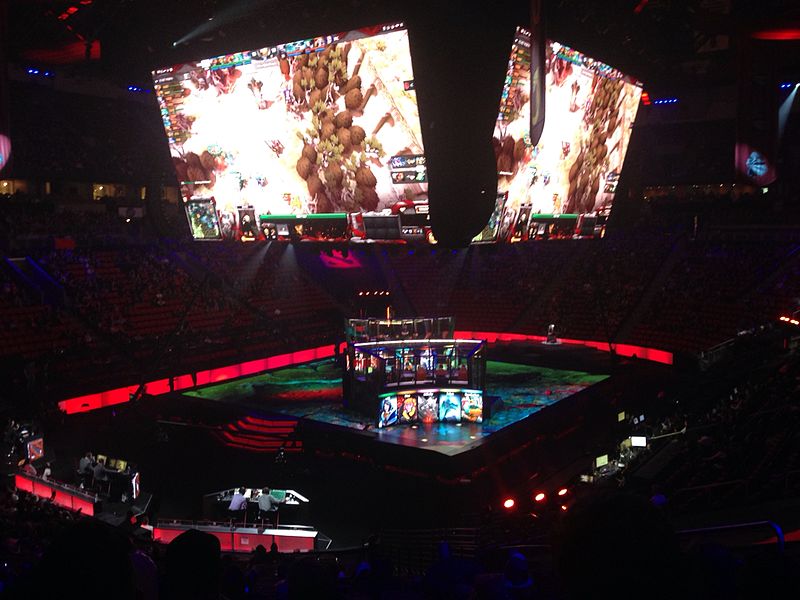|
As the novel coronavirus shuts down stadiums and theaters across the country, one entertainment industry sees opportunity in the cancelled events. Esports, which in 2019 commanded a global audience of more than 433 million, is poised to grow as people seek socially distant forms of entertainment.
The industry's advantage lies in its flexibility. Unlike athletic games and artistic performances, esports competitions can be held entirely online, with gamers facing each other remotely in matches live-streamed to far-flung audiences numbering in the millions. The closure of schools, offices, and traditional entertainment venues in China has already led to a significant spike in esports viewership. According to the Washington Post, the esports organization Gen.G reported an increase of 18.2 percent in Chinese viewership on two of its live-streaming sites for its Player Unknown's Battlegrounds and League of Legends teams. Meanwhile, over the past week the streaming app Twitch saw increases in first-time downloads of 50 percent, 41 percent, and 26 percent in Greece, Italy, and Spain, respectively, and 14 percent in the United States, which is still in the early stages of quarantine. "There is an opportunity to expand their audiences," according to video gaming market analyst Michael Pachter, quoted in the Post. "It won't expand by 50 percent, but it could possibly expand by 20 percent." The coronavirus has, of course, presented challenges to the esports industry. In recent years, esports leagues have held live tournaments in both designated and makeshift venues, which can attract audiences in the tens of thousands. The social aspect of these often multi-day events is often as important as the competition itself. Spectators alternate between watching the professional games, playing each other, and patronizing esports vendors. Numerous tournaments have been cancelled as venues shut down over public health concerns. Nevertheless, the opportunities for virtual gaming and live-streaming promise to introduce new viewers to esports, expanding the industry's reach. A rise in the popularity of esports presents opportunities not only to gaming professionals, but to adjacent industries. Development projects like the Aud will be well-positioned to take advantage of the growth of esports once the economy - and daily life - returns to normal. A recent Wall Street Journal article highlighted Worcester's Becker College as a national leader in in the rapidly growing esports industry. Esports, which involves live and streamed multi-player video game competitions and is tied closely to game production, has achieved international popularity rivaling that of major league sports in the United States. The industry is projected to grow to $1.7 billion by 2021, and its viewership, to half a billion people. The Journal noted that Becker, already renowned for its program in video game design, is the first institution of higher education in the country to offer an Esports Management degree.
The Architectural Heritage Foundation is partnering with Becker College to study potential uses for the Aud. The school has contributed its expertise in interactive media to developing a vision of the Aud as a cultural and educational institution devoted to technological innovation. Read the Wall Street Journal article here: http://www.wbjournal.com/article/20181210/PRINTEDITION/312079995/1004?utm_source=enews&utm_medium=DailyReport&utm_campaign=Thursday E-sports is rapidly becoming a major athletic and economic player. Can the city of Worcester get in the game early with the Aud redevelopment project? “The games that are competitively viable in the collegiate sphere have real depth, have deep levels of strategy, and require strategic teamwork and require real mastery to be successful — and not just by yourself, within a team environment and through using tactics.” Read the full New York Times article here.
On September 9, the Worcester Telegram featured the Worcester Aud redevelopment project in its news coverage. The article emphasized AHF's partnership with Becker College to explore possible uses of the Aud as a visual arts and technology center: City Manager Edward M. Augustus Jr. said the two parties are looking into the feasibility of converting part of the Lincoln Square landmark into a cutting-edge, interactive media, technology and arts center. He said it would support content creation, streaming, competitive gaming, online production and include an eSports venue, as well as collaboration, education, design and development facilities. Read the full story here: http://www.telegram.com/news/20180909/becker-tech-arts-center-emerges-as-possible-use-for-worcester-aud
|
AuthorArchitectural Heritage Foundation (AHF) is working to preserve and redevelop the Worcester Memorial Auditorium as a cutting-edge center for digital innovation. Archives
May 2022
Categories
All
|

 RSS Feed
RSS Feed